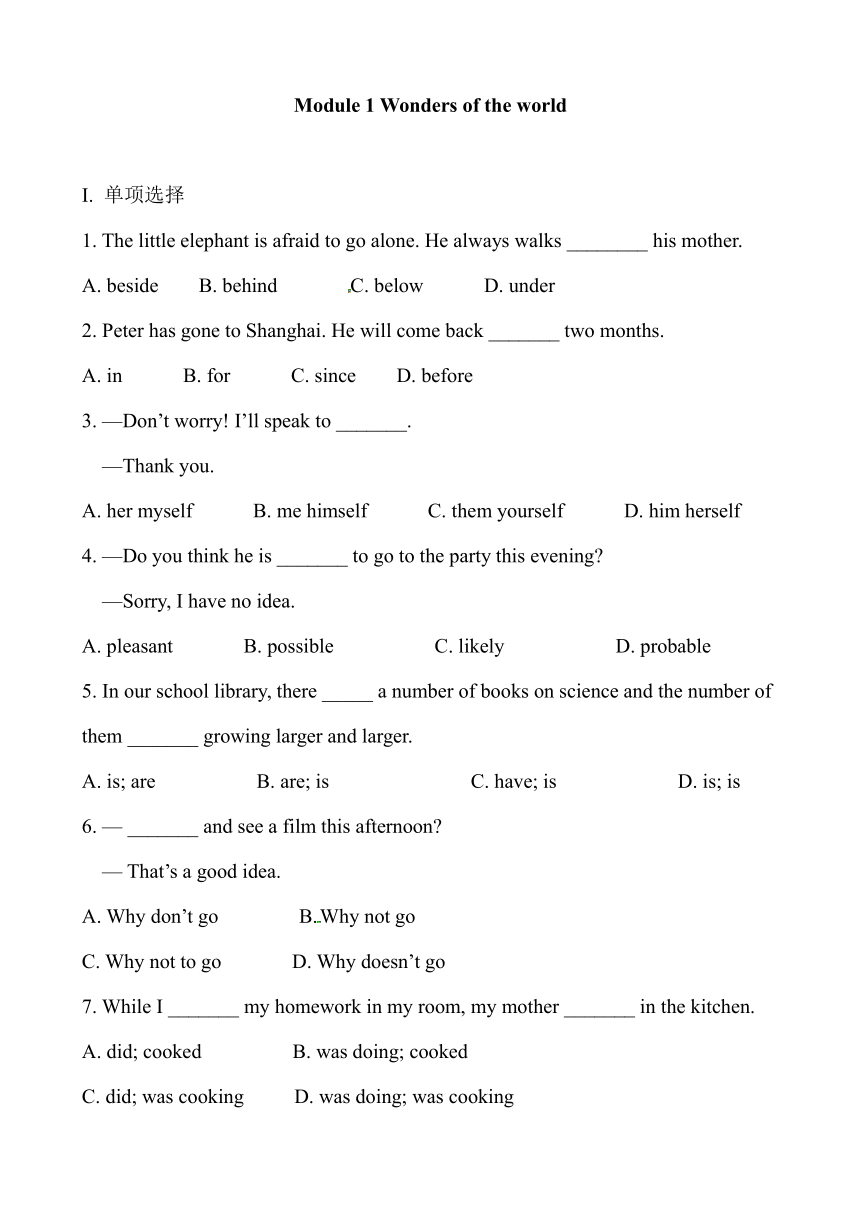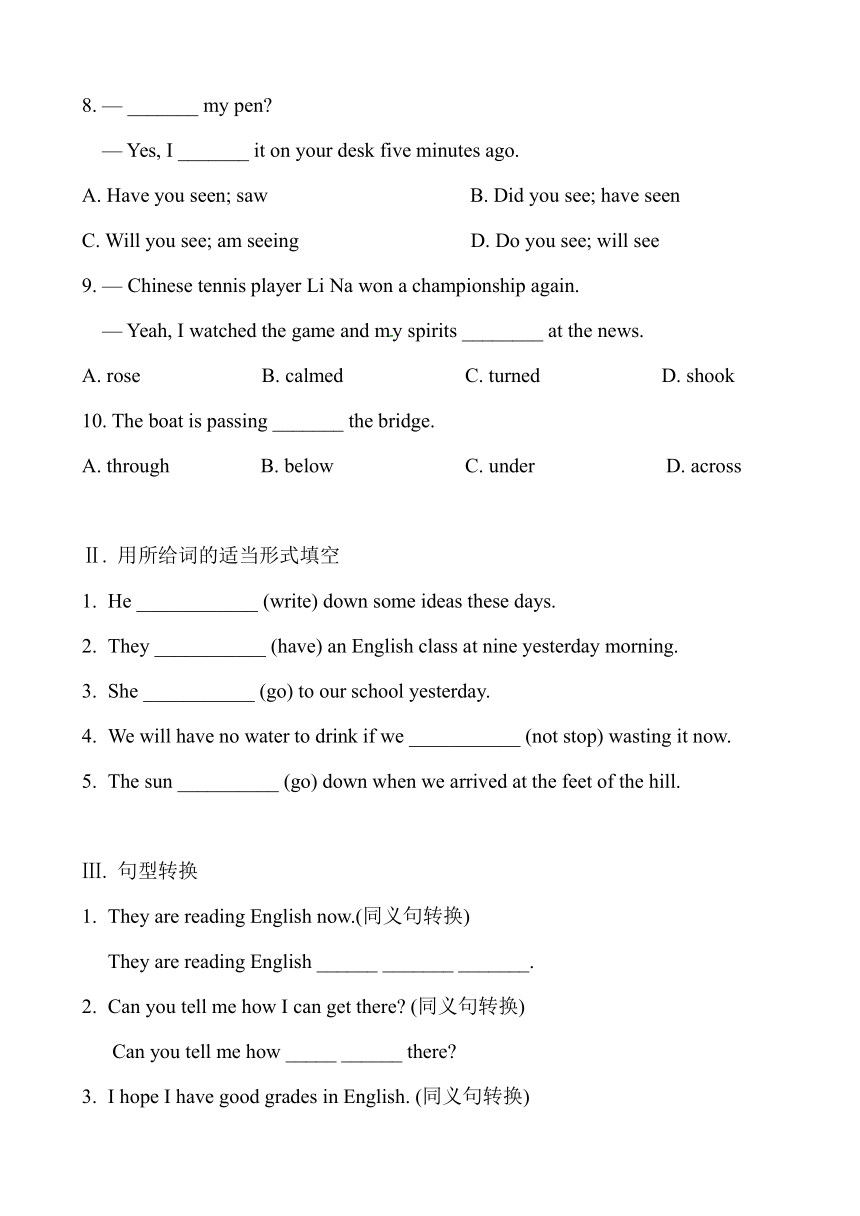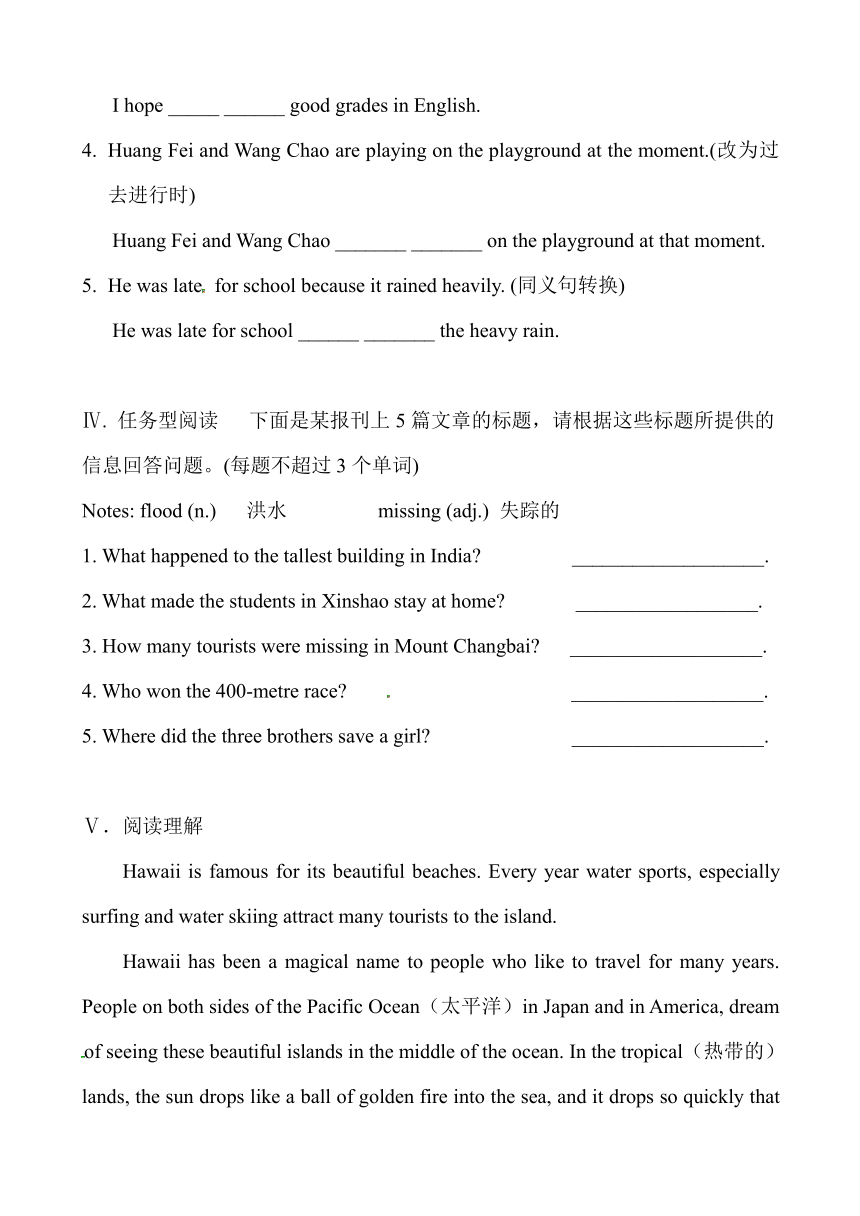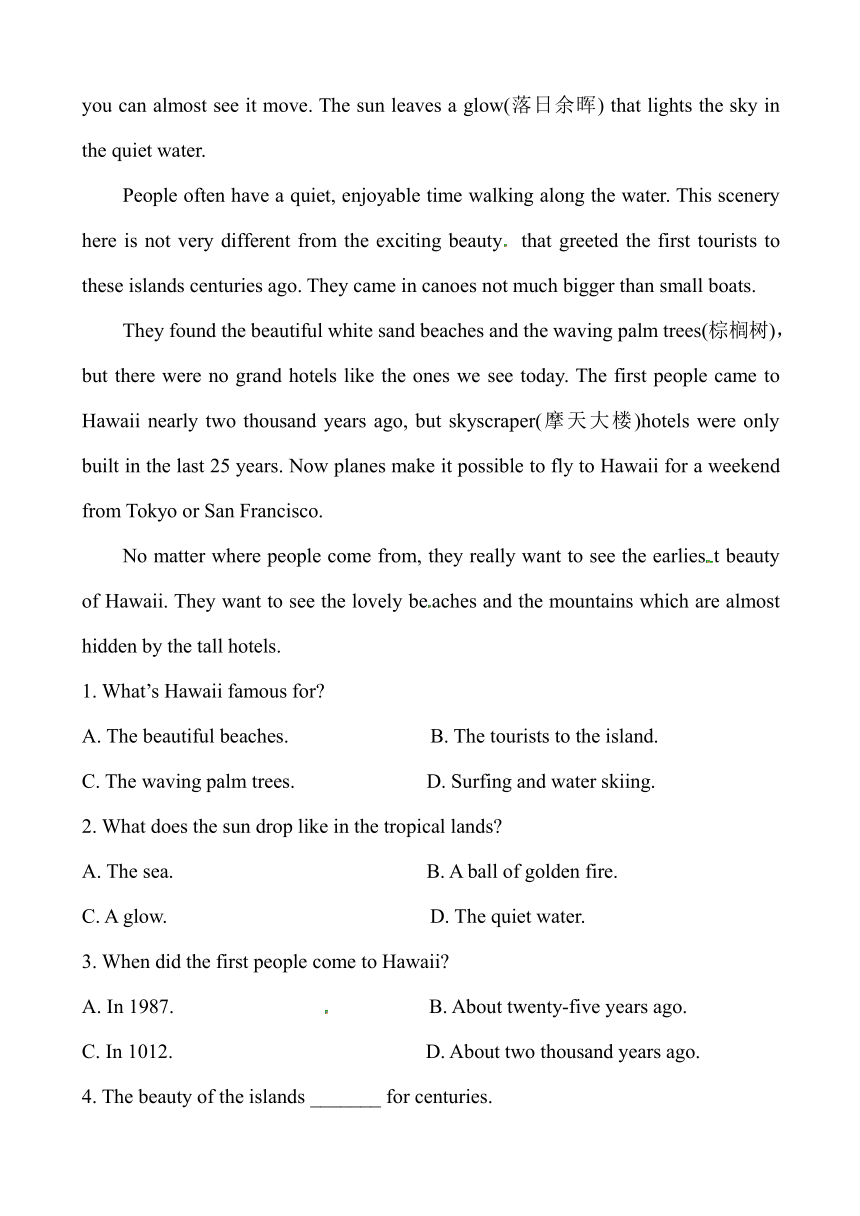外研版英语九年级上 Module 1 Wonders of the world 模块训练题(含答案无听力题)
文档属性
| 名称 | 外研版英语九年级上 Module 1 Wonders of the world 模块训练题(含答案无听力题) |  | |
| 格式 | zip | ||
| 文件大小 | 24.6KB | ||
| 资源类型 | 教案 | ||
| 版本资源 | 外研版 | ||
| 科目 | 英语 | ||
| 更新时间 | 2020-08-13 01:04:13 | ||
图片预览




文档简介
Module
1
Wonders
of
the
world
I.
单项选择
1.
The
little
elephant
is
afraid
to
go
alone.
He
always
walks
________
his
mother.
A.
beside
B.
behind
C.
below
D.
under
2.
Peter
has
gone
to
Shanghai.
He
will
come
back
_______
two
months.
A.
in
B.
for
C.
since
D.
before
3.
—Don’t
worry!
I’ll
speak
to
_______.
—Thank
you.
A.
her
myself
B.
me
himself
C.
them
yourself
D.
him
herself
4.
—Do
you
think
he
is
_______
to
go
to
the
party
this
evening?
—Sorry,
I
have
no
idea.
A.
pleasant
B.
possible
C.
likely
D.
probable
5.
In
our
school
library,
there
_____
a
number
of
books
on
science
and
the
number
of
them
_______
growing
larger
and
larger.
A.
is;
are
B.
are;
is
C.
have;
is
D.
is;
is
6.
—
_______
and
see
a
film
this
afternoon?
—
That’s
a
good
idea.
A.
Why
don’t
go
B.Why
not
go
C.
Why
not
to
go
D.
Why
doesn’t
go
7.
While
I
_______
my
homework
in
my
room,
my
mother
_______
in
the
kitchen.
A.
did;
cooked
B.
was
doing;
cooked
C.
did;
was
cooking
D.
was
doing;
was
cooking
8.
—
_______
my
pen?
—
Yes,
I
_______
it
on
your
desk
five
minutes
ago.
A.
Have
you
seen;
saw
B.
Did
you
see;
have
seen
C.
Will
you
see;
am
seeing
D.
Do
you
see;
will
see
9.
—
Chinese
tennis
player
Li
Na
won
a
championship
again.
—
Yeah,
I
watched
the
game
and
my
spirits
________
at
the
news.
A.
rose
B.
calmed
C.
turned
D.
shook
10.
The
boat
is
passing
_______
the
bridge.
A.
through
B.
below
C.
under
D.
across
Ⅱ.
用所给词的适当形式填空
He
____________
(write)
down
some
ideas
these
days.
They
___________
(have)
an
English
class
at
nine
yesterday
morning.
She
___________
(go)
to
our
school
yesterday.
We
will
have
no
water
to
drink
if
we
___________
(not
stop)
wasting
it
now.
The
sun
__________
(go)
down
when
we
arrived
at
the
feet
of
the
hill.
Ⅲ.
句型转换
They
are
reading
English
now.(同义句转换)
They
are
reading
English
______
_______
_______.
Can
you
tell
me
how
I
can
get
there?
(同义句转换)
Can
you
tell
me
how
_____
______
there?
I
hope
I
have
good
grades
in
English.
(同义句转换)
I
hope
_____
______
good
grades
in
English.
Huang
Fei
and
Wang
Chao
are
playing
on
the
playground
at
the
moment.(改为过去进行时)
Huang
Fei
and
Wang
Chao
_______
_______
on
the
playground
at
that
moment.
He
was
late
for
school
because
it
rained
heavily.
(同义句转换)
He
was
late
for
school
______
_______
the
heavy
rain.
Ⅳ.
任务型阅读
下面是某报刊上5篇文章的标题,请根据这些标题所提供的
信息回答问题。(每题不超过3个单词)
Notes:
flood
(n.)
洪水
missing
(adj.)
失踪的
1.
What
happened
to
the
tallest
building
in
India?
___________________.
2.
What
made
the
students
in
Xinshao
stay
at
home?
__________________.
3.
How
many
tourists
were
missing
in
Mount
Changbai?
___________________.
4.
Who
won
the
400-metre
race?
___________________.
5.
Where
did
the
three
brothers
save
a
girl?
___________________.
Ⅴ.阅读理解
Hawaii
is
famous
for
its
beautiful
beaches.
Every
year
water
sports,
especially
surfing
and
water
skiing
attract
many
tourists
to
the
island.
Hawaii
has
been
a
magical
name
to
people
who
like
to
travel
for
many
years.
People
on
both
sides
of
the
Pacific
Ocean(太平洋)in
Japan
and
in
America,
dream
of
seeing
these
beautiful
islands
in
the
middle
of
the
ocean.
In
the
tropical(热带的)lands,
the
sun
drops
like
a
ball
of
golden
fire
into
the
sea,
and
it
drops
so
quickly
that
you
can
almost
see
it
move.
The
sun
leaves
a
glow(落日余晖)
that
lights
the
sky
in
the
quiet
water.
People
often
have
a
quiet,
enjoyable
time
walking
along
the
water.
This
scenery
here
is
not
very
different
from
the
exciting
beauty
that
greeted
the
first
tourists
to
these
islands
centuries
ago.
They
came
in
canoes
not
much
bigger
than
small
boats.
They
found
the
beautiful
white
sand
beaches
and
the
waving
palm
trees(棕榈树),but
there
were
no
grand
hotels
like
the
ones
we
see
today.
The
first
people
came
to
Hawaii
nearly
two
thousand
years
ago,
but
skyscraper(摩天大楼)hotels
were
only
built
in
the
last
25
years.
Now
planes
make
it
possible
to
fly
to
Hawaii
for
a
weekend
from
Tokyo
or
San
Francisco.
No
matter
where
people
come
from,
they
really
want
to
see
the
earliest
beauty
of
Hawaii.
They
want
to
see
the
lovely
beaches
and
the
mountains
which
are
almost
hidden
by
the
tall
hotels.
1.
What’s
Hawaii
famous
for?
A.
The
beautiful
beaches.
B.
The
tourists
to
the
island.
C.
The
waving
palm
trees.
D.
Surfing
and
water
skiing.
2.
What
does
the
sun
drop
like
in
the
tropical
lands?
A.
The
sea.
B.
A
ball
of
golden
fire.
C.
A
glow.
D.
The
quiet
water.
3.
When
did
the
first
people
come
to
Hawaii?
A.
In
1987.
B.
About
twenty-five
years
ago.
C.
In
1012.
D.
About
two
thousand
years
ago.
4.
The
beauty
of
the
islands
_______
for
centuries.
A.
has
changed
B.
has
greeted
the
first
tourists
C.
has
remained
nearly
unchanged
D.
has
been
the
same
5.
Which
is
true
according
to
the
passage?
A.
People
really
want
to
see
the
earliest
beauty
of
Hawaii.
B.
People
often
have
a
quiet,
unhappy
time
walking
along
the
water.
C.
People
only
in
Japan
dream
of
seeing
the
beautiful
islands.
D.
People
found
the
beautiful
red
sand
beaches
in
Hawaii.
People
all
over
the
world
write
to
Big
Ben.
They
even
send
birthday
presents.
Big
Ben
is
not
a
person.
It’s
a
clock.
Big
Ben
is
the
great
clock
hanging
up
in
a
tower
of
the
parliament
building.
The
people
of
London
like
to
see
Big
Ben’s
four
friendly
faces.
They
like
to
hear
the
clock
striking
(敲)
the
hour.
Bong!
Bong!
Bong!
Big
Ben’s
story
started
in
1834.
In
that
year
the
old
parliament
building
was
burned
down.
Its
clock
tower
fell
to
the
ground.
There
had
to
be
a
new
building
and
a
new
clock.
Plans
were
made.
They
called
for
a
“King
of
Clock,
the
biggest
and
the
best
in
the
world”.
So
the
clock
had
to
be
big.
And
it
had
to
keep
very
good
time.
In
two
years
the
big
clock
was
made.
Five
more
years
went
by
before
the
clock
tower
was
last
finished.
Then
the
four
bells
for
the
chimes
(鸣响)
were
brought
into
the
tower.
And
at
last
the
big
hour
bell
was
put
in
place.
It
rang
out
for
the
first
time
on
July
11,
1859.
This
great
bell
had
to
have
a
name.
A
meeting
of
parliament
was
called
to
pick
one.
“This
clock
is
the
king
of
clocks,”
one
man
said.
“Let’s
call
the
bell
the
Queen
of
Bells.”
“Then
why
not
Victoria?”
said
another
(Victoria
was
the
British
queen
(英国女王)
at
that
time).
The
talk
about
names
went
on
and
on.
Then
Benjamin
Hall
got
up
to
speak.
He
was
a
big
man.
By
this
time
they
were
all
tired.
Someone
shouted,
“Why
not
call
it
Big
Ben?”
Everybody
laughed,
and
the
meeting
was
over.
But
it
was
called
Big
Ben
from
then
on.
Not
just
the
bell
but
the
whole
clock.
69.
In
1834,
what
happened
to
the
clock
tower?
People
finished
the
clock
tower.
B.
People
sold
the
clock
tower.
C.
People
polluted
the
clock
tower.
D.
The
clock
tower
broke
down.
7.
Big
Ben
is
the
name
of
a
_______.
building
B.
clock
C.
beautiful
girl
D.
city
8.
It
took
_____
to
build
the
clock
tower.
A.
seven
years
B.
five
years
C.
two
years
D.
the
passage
doesn’t
tell
us
9.
In
which
year
might
Victoria
be
the
British
queen?
A.
1583
B.
1768
C.
1620
D.
1863
10.
Which
is
the
best
title
(标题)for
this
passage?
Why
Big
Ben
Is
So
Big
B.
British
Parliament
Building
C.
How
Big
Ben
Got
Its
Name
D.
British
Queen
Victoria
VI.
根据短文内容及首字母提示补全短文
Have
you
ever
enjoyed
your
meals
in
the
USA
before?
If
you
have,
I’m
sure
you
will
find
Americans
have
quite
a
1.
d________
way
to
eat.
For
2.
e________,
you
may
have
problems
eating
when
you
are
in
the
USA,
because
you
can’t
use
3.
c________.
Knives
and
forks
are
4.
u________
for
the
most
food.
Soup
is
drunk
5.
w_______
spoons.
A
lot
of
6.
d________
will
be
served
if
you
are
the
guest
for
the
first
time.
And
the
main
7.
c________
is
usually
beef
or
chicken.
At
the
end
of
the
dinner,
you
can
enjoy
delicious
desserts,
8.
l________
ice
cream
or
cheese
cakes.
But
don’t
leave
as
soon
as
you
finish
eating,
it
is
9.
i________.
Stay
10.
a________
the
table
and
have
a
nice
talk
with
the
host
family.
答案:
I.
1-10
AAACB
BDAAC
II.
1.
has
written
2.
were
having
3.
went
4.
don’t
stop
5.
was
going
Ⅲ.
1.
at
the
moment
2.
to
get
3.
to
have
4.
were
playing
5.
because
of
Ⅳ.
1.
A
fire
2.
The
flood
3.
Two
4.
Ted
5.
In
Xinjiang
Ⅴ.
1.
A
2.
B
3.
D
4.
C
5.
A
6.
D
7.
B
8.
A
9.
D
10.
C
VI.
1.
different
2.
example
3.
chopsticks
4.
used
5.
with
6.
dishes
7.
course
8.
like
9.
impolite
10.
around
1
Wonders
of
the
world
I.
单项选择
1.
The
little
elephant
is
afraid
to
go
alone.
He
always
walks
________
his
mother.
A.
beside
B.
behind
C.
below
D.
under
2.
Peter
has
gone
to
Shanghai.
He
will
come
back
_______
two
months.
A.
in
B.
for
C.
since
D.
before
3.
—Don’t
worry!
I’ll
speak
to
_______.
—Thank
you.
A.
her
myself
B.
me
himself
C.
them
yourself
D.
him
herself
4.
—Do
you
think
he
is
_______
to
go
to
the
party
this
evening?
—Sorry,
I
have
no
idea.
A.
pleasant
B.
possible
C.
likely
D.
probable
5.
In
our
school
library,
there
_____
a
number
of
books
on
science
and
the
number
of
them
_______
growing
larger
and
larger.
A.
is;
are
B.
are;
is
C.
have;
is
D.
is;
is
6.
—
_______
and
see
a
film
this
afternoon?
—
That’s
a
good
idea.
A.
Why
don’t
go
B.Why
not
go
C.
Why
not
to
go
D.
Why
doesn’t
go
7.
While
I
_______
my
homework
in
my
room,
my
mother
_______
in
the
kitchen.
A.
did;
cooked
B.
was
doing;
cooked
C.
did;
was
cooking
D.
was
doing;
was
cooking
8.
—
_______
my
pen?
—
Yes,
I
_______
it
on
your
desk
five
minutes
ago.
A.
Have
you
seen;
saw
B.
Did
you
see;
have
seen
C.
Will
you
see;
am
seeing
D.
Do
you
see;
will
see
9.
—
Chinese
tennis
player
Li
Na
won
a
championship
again.
—
Yeah,
I
watched
the
game
and
my
spirits
________
at
the
news.
A.
rose
B.
calmed
C.
turned
D.
shook
10.
The
boat
is
passing
_______
the
bridge.
A.
through
B.
below
C.
under
D.
across
Ⅱ.
用所给词的适当形式填空
He
____________
(write)
down
some
ideas
these
days.
They
___________
(have)
an
English
class
at
nine
yesterday
morning.
She
___________
(go)
to
our
school
yesterday.
We
will
have
no
water
to
drink
if
we
___________
(not
stop)
wasting
it
now.
The
sun
__________
(go)
down
when
we
arrived
at
the
feet
of
the
hill.
Ⅲ.
句型转换
They
are
reading
English
now.(同义句转换)
They
are
reading
English
______
_______
_______.
Can
you
tell
me
how
I
can
get
there?
(同义句转换)
Can
you
tell
me
how
_____
______
there?
I
hope
I
have
good
grades
in
English.
(同义句转换)
I
hope
_____
______
good
grades
in
English.
Huang
Fei
and
Wang
Chao
are
playing
on
the
playground
at
the
moment.(改为过去进行时)
Huang
Fei
and
Wang
Chao
_______
_______
on
the
playground
at
that
moment.
He
was
late
for
school
because
it
rained
heavily.
(同义句转换)
He
was
late
for
school
______
_______
the
heavy
rain.
Ⅳ.
任务型阅读
下面是某报刊上5篇文章的标题,请根据这些标题所提供的
信息回答问题。(每题不超过3个单词)
Notes:
flood
(n.)
洪水
missing
(adj.)
失踪的
1.
What
happened
to
the
tallest
building
in
India?
___________________.
2.
What
made
the
students
in
Xinshao
stay
at
home?
__________________.
3.
How
many
tourists
were
missing
in
Mount
Changbai?
___________________.
4.
Who
won
the
400-metre
race?
___________________.
5.
Where
did
the
three
brothers
save
a
girl?
___________________.
Ⅴ.阅读理解
Hawaii
is
famous
for
its
beautiful
beaches.
Every
year
water
sports,
especially
surfing
and
water
skiing
attract
many
tourists
to
the
island.
Hawaii
has
been
a
magical
name
to
people
who
like
to
travel
for
many
years.
People
on
both
sides
of
the
Pacific
Ocean(太平洋)in
Japan
and
in
America,
dream
of
seeing
these
beautiful
islands
in
the
middle
of
the
ocean.
In
the
tropical(热带的)lands,
the
sun
drops
like
a
ball
of
golden
fire
into
the
sea,
and
it
drops
so
quickly
that
you
can
almost
see
it
move.
The
sun
leaves
a
glow(落日余晖)
that
lights
the
sky
in
the
quiet
water.
People
often
have
a
quiet,
enjoyable
time
walking
along
the
water.
This
scenery
here
is
not
very
different
from
the
exciting
beauty
that
greeted
the
first
tourists
to
these
islands
centuries
ago.
They
came
in
canoes
not
much
bigger
than
small
boats.
They
found
the
beautiful
white
sand
beaches
and
the
waving
palm
trees(棕榈树),but
there
were
no
grand
hotels
like
the
ones
we
see
today.
The
first
people
came
to
Hawaii
nearly
two
thousand
years
ago,
but
skyscraper(摩天大楼)hotels
were
only
built
in
the
last
25
years.
Now
planes
make
it
possible
to
fly
to
Hawaii
for
a
weekend
from
Tokyo
or
San
Francisco.
No
matter
where
people
come
from,
they
really
want
to
see
the
earliest
beauty
of
Hawaii.
They
want
to
see
the
lovely
beaches
and
the
mountains
which
are
almost
hidden
by
the
tall
hotels.
1.
What’s
Hawaii
famous
for?
A.
The
beautiful
beaches.
B.
The
tourists
to
the
island.
C.
The
waving
palm
trees.
D.
Surfing
and
water
skiing.
2.
What
does
the
sun
drop
like
in
the
tropical
lands?
A.
The
sea.
B.
A
ball
of
golden
fire.
C.
A
glow.
D.
The
quiet
water.
3.
When
did
the
first
people
come
to
Hawaii?
A.
In
1987.
B.
About
twenty-five
years
ago.
C.
In
1012.
D.
About
two
thousand
years
ago.
4.
The
beauty
of
the
islands
_______
for
centuries.
A.
has
changed
B.
has
greeted
the
first
tourists
C.
has
remained
nearly
unchanged
D.
has
been
the
same
5.
Which
is
true
according
to
the
passage?
A.
People
really
want
to
see
the
earliest
beauty
of
Hawaii.
B.
People
often
have
a
quiet,
unhappy
time
walking
along
the
water.
C.
People
only
in
Japan
dream
of
seeing
the
beautiful
islands.
D.
People
found
the
beautiful
red
sand
beaches
in
Hawaii.
People
all
over
the
world
write
to
Big
Ben.
They
even
send
birthday
presents.
Big
Ben
is
not
a
person.
It’s
a
clock.
Big
Ben
is
the
great
clock
hanging
up
in
a
tower
of
the
parliament
building.
The
people
of
London
like
to
see
Big
Ben’s
four
friendly
faces.
They
like
to
hear
the
clock
striking
(敲)
the
hour.
Bong!
Bong!
Bong!
Big
Ben’s
story
started
in
1834.
In
that
year
the
old
parliament
building
was
burned
down.
Its
clock
tower
fell
to
the
ground.
There
had
to
be
a
new
building
and
a
new
clock.
Plans
were
made.
They
called
for
a
“King
of
Clock,
the
biggest
and
the
best
in
the
world”.
So
the
clock
had
to
be
big.
And
it
had
to
keep
very
good
time.
In
two
years
the
big
clock
was
made.
Five
more
years
went
by
before
the
clock
tower
was
last
finished.
Then
the
four
bells
for
the
chimes
(鸣响)
were
brought
into
the
tower.
And
at
last
the
big
hour
bell
was
put
in
place.
It
rang
out
for
the
first
time
on
July
11,
1859.
This
great
bell
had
to
have
a
name.
A
meeting
of
parliament
was
called
to
pick
one.
“This
clock
is
the
king
of
clocks,”
one
man
said.
“Let’s
call
the
bell
the
Queen
of
Bells.”
“Then
why
not
Victoria?”
said
another
(Victoria
was
the
British
queen
(英国女王)
at
that
time).
The
talk
about
names
went
on
and
on.
Then
Benjamin
Hall
got
up
to
speak.
He
was
a
big
man.
By
this
time
they
were
all
tired.
Someone
shouted,
“Why
not
call
it
Big
Ben?”
Everybody
laughed,
and
the
meeting
was
over.
But
it
was
called
Big
Ben
from
then
on.
Not
just
the
bell
but
the
whole
clock.
69.
In
1834,
what
happened
to
the
clock
tower?
People
finished
the
clock
tower.
B.
People
sold
the
clock
tower.
C.
People
polluted
the
clock
tower.
D.
The
clock
tower
broke
down.
7.
Big
Ben
is
the
name
of
a
_______.
building
B.
clock
C.
beautiful
girl
D.
city
8.
It
took
_____
to
build
the
clock
tower.
A.
seven
years
B.
five
years
C.
two
years
D.
the
passage
doesn’t
tell
us
9.
In
which
year
might
Victoria
be
the
British
queen?
A.
1583
B.
1768
C.
1620
D.
1863
10.
Which
is
the
best
title
(标题)for
this
passage?
Why
Big
Ben
Is
So
Big
B.
British
Parliament
Building
C.
How
Big
Ben
Got
Its
Name
D.
British
Queen
Victoria
VI.
根据短文内容及首字母提示补全短文
Have
you
ever
enjoyed
your
meals
in
the
USA
before?
If
you
have,
I’m
sure
you
will
find
Americans
have
quite
a
1.
d________
way
to
eat.
For
2.
e________,
you
may
have
problems
eating
when
you
are
in
the
USA,
because
you
can’t
use
3.
c________.
Knives
and
forks
are
4.
u________
for
the
most
food.
Soup
is
drunk
5.
w_______
spoons.
A
lot
of
6.
d________
will
be
served
if
you
are
the
guest
for
the
first
time.
And
the
main
7.
c________
is
usually
beef
or
chicken.
At
the
end
of
the
dinner,
you
can
enjoy
delicious
desserts,
8.
l________
ice
cream
or
cheese
cakes.
But
don’t
leave
as
soon
as
you
finish
eating,
it
is
9.
i________.
Stay
10.
a________
the
table
and
have
a
nice
talk
with
the
host
family.
答案:
I.
1-10
AAACB
BDAAC
II.
1.
has
written
2.
were
having
3.
went
4.
don’t
stop
5.
was
going
Ⅲ.
1.
at
the
moment
2.
to
get
3.
to
have
4.
were
playing
5.
because
of
Ⅳ.
1.
A
fire
2.
The
flood
3.
Two
4.
Ted
5.
In
Xinjiang
Ⅴ.
1.
A
2.
B
3.
D
4.
C
5.
A
6.
D
7.
B
8.
A
9.
D
10.
C
VI.
1.
different
2.
example
3.
chopsticks
4.
used
5.
with
6.
dishes
7.
course
8.
like
9.
impolite
10.
around
同课章节目录
- Module 1 Wonders of the world
- Unit 1 It's more than 2,000 years old.
- Unit 2 The Grand Canyon was not just big.
- Unit 3 Language in use
- Module 2 Public holidays
- Unit 1 My family always go somewhere interesting a
- Unit 2 We have celebrated the festival since the f
- Unit 3 Language in use
- Module 3 Heroes
- Unit 1 She trained hard,so she became a great play
- Unit 2There were few doctors, so he had to work ve
- Unit 3 Language in use
- Module 4 Home alone
- Unit 1 I can look after myself, although it won’t
- Unit 2 I became so bored with their orders that I
- Unit 3 Language in use
- Module 5 Museums
- Unit 1 Don't cross that rope!
- Unit 2 If you ever go to London, make sure you vis
- Unit 3 Language in use
- Module 6 Problems
- Unit 1 If I start after dinner, I'll finish it be
- Unit 2 If you tell him the truth now, you will sho
- Unit 3 Language in use
- Revision Module A
- Module 7 Great books
- Unit 1 We're still influenced by Confucius's idea
- Unit 2 It is still read and loved.
- Unit 3 Language in use
- Module 8 Sports life
- Unit 1 Daming wasn't chosen for the team last time
- Unit 2 He was invited to competitions around the w
- Unit 3 Language in use
- Module 9 Great inventions
- Unit 1 Will computers be used more than books in t
- Unit 2 Will books be replaced by the Internet?
- Unit 3 Language in use
- Module 10 Australia
- Unit 1 I have some photos that I took in Australia
- Unit 2 The game that they like most is Australian
- Unit 3 Language in use
- Module 11 Photos
- Unit 1 He's the boy who won the photo competition
- Unit 2 The photo which we liked best was taken by
- Unit 3 Language in use
- Module 12 Save our world
- Unit 1 If everyone starts to do something, the wor
- Unit 2 Repeat these three words daily: reduce, reu
- Unit 3 Language in use
- Revision Module B
